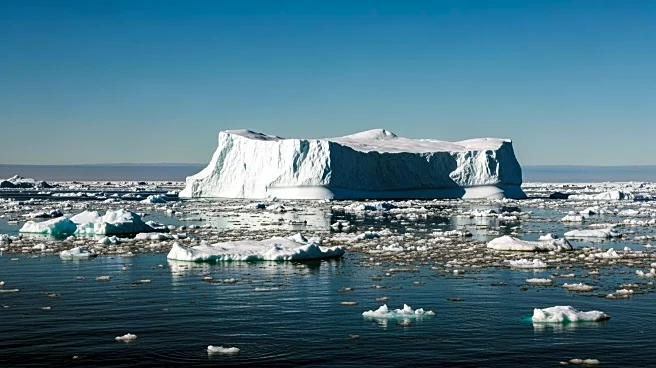What's Happening?
The Hektoria glacier on the Antarctic Peninsula has experienced an unprecedented retreat, shrinking by 25 kilometers in just 15 months. This rapid retreat is considered the fastest documented in modern
history. Researchers from the University of Colorado Boulder, led by Naomi Ochwat, attribute this phenomenon to the glacier's configuration, which led to a runaway surge in iceberg production. The glacier's thinning trunk withdrew across a flat bedrock area, triggering its collapse. This event has sparked debate within the glaciological community, with some experts questioning the accuracy of satellite records and the glacier's grounding status.
Why It's Important?
The rapid retreat of the Hektoria glacier has significant implications for global sea level rise. If similar mechanisms affect other Antarctic glaciers, it could accelerate the rate of sea level increase, impacting coastal communities worldwide. The event highlights the vulnerability of glaciers to climate change and the potential for sudden, large-scale ice loss. This development underscores the need for improved monitoring and understanding of glacier dynamics to predict future changes accurately. The controversy among scientists also points to the challenges in interpreting satellite data and the importance of consensus in scientific assessments.
What's Next?
Further research is needed to determine if the Hektoria glacier's retreat is an isolated incident or indicative of broader trends affecting other glaciers. Scientists will likely focus on improving satellite monitoring and data accuracy to better understand glacier grounding and movement. The findings could influence climate policy and adaptation strategies, particularly for regions vulnerable to sea level rise. Ongoing debates within the scientific community may lead to new studies and collaborations to resolve discrepancies and enhance predictive models.
Beyond the Headlines
The retreat of the Hektoria glacier raises ethical and policy questions about the responsibility of nations to address climate change and its impacts. The event may prompt discussions on international cooperation in climate research and the allocation of resources for mitigation and adaptation efforts. It also highlights the need for public awareness and education on the consequences of climate change, encouraging proactive measures to reduce carbon emissions and protect vulnerable ecosystems.








